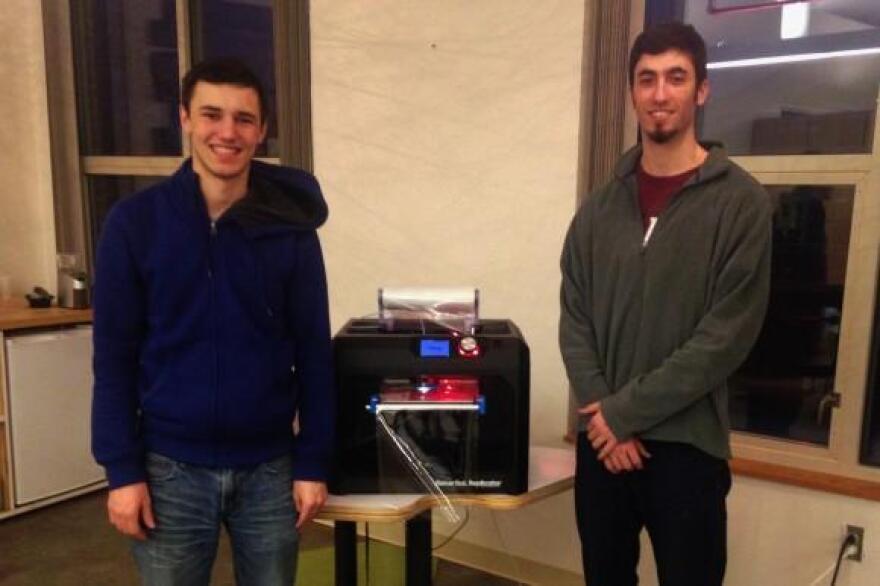Penn State’s initiative to promote entrepreneurship has helped programs like Lion Launch Pad, New Leaf and the Small Business Development Center. One in particular, Lion Launch Pad, serves as a business accelerator program that helps selected students turn their ideas into startups.
Liz Kisenwether and Brad Leve advise the group in the Information Sciences and Technology Building. But according to Kisenwether, it took a lot of steps to get there. Lion Launch Pad started as an idea seven years ago, but ran into obstacles running as a for-profit venture on campus.
“As soon as we started doing that Penn State’s like, ‘Woah, wait a second, as soon as you start selling products you’re becoming a for profit venture and we can’t have any of those on campus,” Kisenwether said. “That violates the whole 501c3 non profit status and we don’t want to lose that.’”
The group moved to a shared space off campus, but after seeing other for-profit businesses on campus -- like the restaurants in the HUB-Robeson Center -- Kisenwether found a way to get the group back on campus.
Now she says six teams of students gather on the first Wednesday of every month in the IST building, where they set goals and bounce around ideas.
“The very first meeting they said, ‘These are the things I want to accomplish in the first month’ and they put them on the board so we listed them and every team did that,” Kisenwether said. “And when you come back a month later they're supposed to report out on their three [goals].”
The students involved with Lion Launch Pad have differing levels of business experience. The program teaches students concepts like market analysis, price points and advertising.
Mary Elizabeth McCulloch is a junior biomedical engineering major who became inspired on a trip to Ecuador as an exchange student. McCullough worked with children who have cerebral palsy and struggle to communicate.
Her “VIVE” project is an assistive speech device that allows users to give responses by moving the parts of their body that do work. A sensor on the device picks up the movements and translates them into a response.
McCulloch posted a video on the Lion Launch Pad site, to show how the VIVE device works.
McCullough understood the software and hardware needed for her product, but a lack of business background prevented her from getting it on the market. She says Lion Launch Pad has provided a road map.
“New Leaf and Lion Launch Pad have given me tools of different applications that they give business majors that basically maps out who are your customers what are your primary costs, resources things like that and it's really helpful,” McCulloch said.
Justin Keenan and Kevin Paroda are practicing their pitch for their project, Mobium Solutions. The other teams call these sophomore engineering majors the “Steve Jobs and Steve Wosniak” of Lion Launch Pad. Mobium Solutions provides an add-on for 3-D printers that makes them work faster. The pair first came up with the idea as roommates freshman year when Keenan brought a 3-D printer for school. Even with such a unique innovation, Paroda says collaborating through Lion Launch Pad has helped to improve their project.
“It’s just so cool to see other people that are passionate about an idea and a business just like we are and learn from the ideas they’ve had about running their business that are different from what we do,” Paroda said.
Callie Rojewski is another member of the program. She developed an app called Time Out. Rojewski, a junior advertising major, decided to come up with a piece of technology that promotes face-to-face communication.
“If you look around and see people sitting together at a restaurant or if you’re hanging out with your friends and family people have their phones out and they’re paying attention to their phones instead of paying attention to each other,” Rojewski said.
Her app challenges users to stay off of their mobile devices for an extended period of time to promote more personal interactions.
Lion Launch Pad has helped Rojewski find a way to differentiate her product from the competition. This fall the app Pocket Points came out. It gives University Park students discounts at local restaurants if they stay off their phones in class.
“What they don’t do is help people become more mindful of their technology habits, which is the first step in making a difference,” Rojewski said. “We want to help people commit to engage in group settings when they’re outside of class with their friends, with their families.”
The members of Lion Launch Pad recently took part in IST Startup Week. Several students were awarded grants for their projects. Paroda and Keenan were recognized in the “Best Idea on the Floor” competition.
Mobium Solutions and the VIVE Project both earned a $10,000 dollar grant as two of the six teams in Penn State’s Inaugural Summer Founders Program. They’ll use the money to continue to work on their start-ups over the summer.


